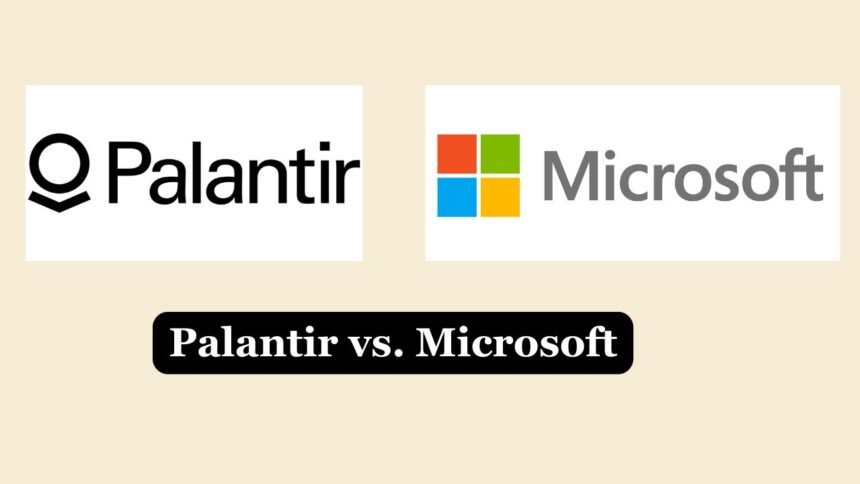The artificial intelligence (AI) landscape is on the verge of explosive growth. With an estimated $1 trillion expected to be invested into AI services over the next several years, this sector is poised for significant transformation.
Many tech giants are preparing to capitalize on this surge, but which companies are set to be the long-term winners?
Today, we’ll dive into two prominent players in the AI race: Palantir Technologies (NYSE: PLTR) and Microsoft (NASDAQ: MSFT). While both are leveraging AI to expand their influence, one of these companies stands out as a more promising long-term AI investment.
Palantir’s AI Strategy: From Government Contracts to Commercial Expansion
Palantir Technologies has been a well-known name in the AI space for years, particularly for its role in providing sophisticated AI tools to government agencies.
The company has made a name for itself by developing cutting-edge AI systems that help government bodies analyze vast amounts of data to make informed decisions.
With over half of its revenue still tied to government contracts, Palantir has a firm grip on this market.
However, the company’s recent shift towards the commercial sector is where it truly begins to show its growth potential. In the second quarter of this year, Palantir reported a 33% jump in commercial segment revenue, representing 45% of its overall sales.
This expansion indicates that Palantir’s AI technology is not only government-grade but is versatile enough to be adapted for commercial use in the rapidly growing AI market.
What makes Palantir stand out is its ability to transition AI prototypes into production-ready systems. As Shyam Sankar, the company’s Chief Technology Officer, mentioned, “Where the market is completely bottlenecked is on that transition from prototyping to production. And that happens to be the place that we are most differentiated.”
Palantir’s investments in AI are already yielding results, with management predicting a 47% rise in U.S. commercial sales in 2024, reaching $672 million.
In addition, the company raised its full-year sales guidance to approximately $2.75 billion, marking a significant 23% growth compared to the previous year.
Microsoft’s AI Play: Leveraging OpenAI and Azure
While Microsoft might not have the same level of AI buzz as Palantir, it’s undoubtedly one of the most influential players in the AI arena.
Microsoft’s early investment of $13 billion into OpenAI, the creator of ChatGPT, is already paying dividends.
The company wasted no time in integrating OpenAI’s technology into its flagship products.
Microsoft has successfully incorporated AI into its popular Microsoft 365 suite, GitHub developer platform, and Azure cloud services, making AI more accessible to millions of users worldwide.
This move has solidified Microsoft’s presence in the AI space, particularly through its cloud service, Azure.
Azure is where Microsoft’s AI future looks most promising. Azure, currently the second-largest cloud service provider globally, commands a 25% market share, second only to Amazon.
The company recently revealed that it now serves 60,000 AI customers, a substantial 60% increase from the previous year.
The cloud computing market is set to explode, with Goldman Sachs predicting it will reach $2 trillion by 2030. Much of this growth is driven by AI, and Microsoft is well-positioned to capitalize on this trend.
As businesses increasingly look to incorporate AI into their operations, Microsoft’s AI-driven cloud services will become an essential resource for many.
Why Microsoft Is the Smarter AI Investment
While Palantir has undoubtedly carved out a niche in the AI space, Microsoft emerges as the better long-term investment, and here’s why.
1. Valuation and Affordability
One key factor that sets Microsoft apart from Palantir is its valuation. Microsoft’s stock is far more affordable compared to Palantir. Currently, Microsoft’s forward price-to-earnings (P/E) ratio sits at 32, while Palantir’s forward P/E is a lofty 87.
For investors looking for growth without paying a hefty premium, Microsoft offers a more attractive option.
2. Deep AI Integration Across Multiple Sectors
Microsoft’s AI prowess isn’t limited to a single market or product. The company’s deep integration of AI across its cloud services, productivity tools, and developer platforms creates a well-rounded AI ecosystem.
With its investment in OpenAI, Microsoft holds a stake in one of the most advanced AI technologies available today, positioning it as a key player in the AI arms race.
Additionally, Microsoft’s significant presence in the cloud computing sector allows it to scale AI solutions globally.
With 60,000 AI customers on Azure, Microsoft is rapidly expanding its footprint in the AI sector, providing tools that enable businesses of all sizes to incorporate AI into their operations.
3. Cloud Computing Potential
The AI market and the cloud computing industry are becoming increasingly intertwined. As companies look for scalable AI solutions, cloud platforms like Azure will play a crucial role.
Microsoft’s established position in the cloud market gives it a significant advantage. With a projected $2 trillion cloud market by 2030, Microsoft is set to capture a sizable portion of AI-driven cloud growth.
Palantir’s Unique Strengths and Challenges
While Palantir has an exciting growth story, especially with its expansion into the commercial sector, there are some hurdles to consider.
Palantir’s heavy reliance on government contracts can limit its flexibility and leave it vulnerable to political changes and budget constraints.
On the flip side, Palantir’s advanced AI capabilities and ability to transition systems from prototype to production give it a competitive edge.
However, the company still needs to prove that its commercial AI solutions can grow at a scale comparable to giants like Microsoft.
Conclusion: Microsoft Is the Clear Winner
While Palantir brings some intriguing AI capabilities to the table, Microsoft is clearly the better long-term AI stock to consider.
With its significant investment in OpenAI, deep AI integration across multiple sectors, and leadership in the cloud computing market, Microsoft is set to benefit from both the growing AI and cloud markets.
Investors looking for solid growth potential without paying a sky-high premium should give Microsoft the edge in their AI stock portfolio.
As AI continues to reshape industries, Microsoft’s broad reach and affordable valuation make it a smarter choice for long-term investors.





